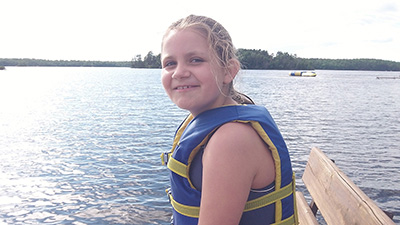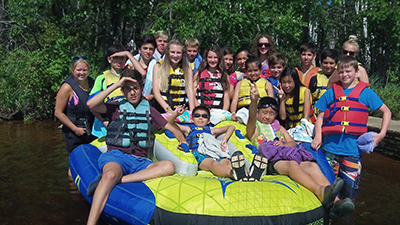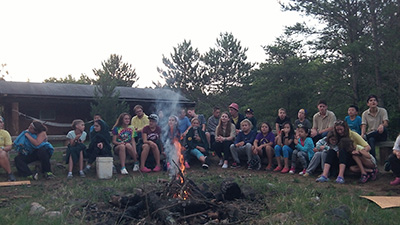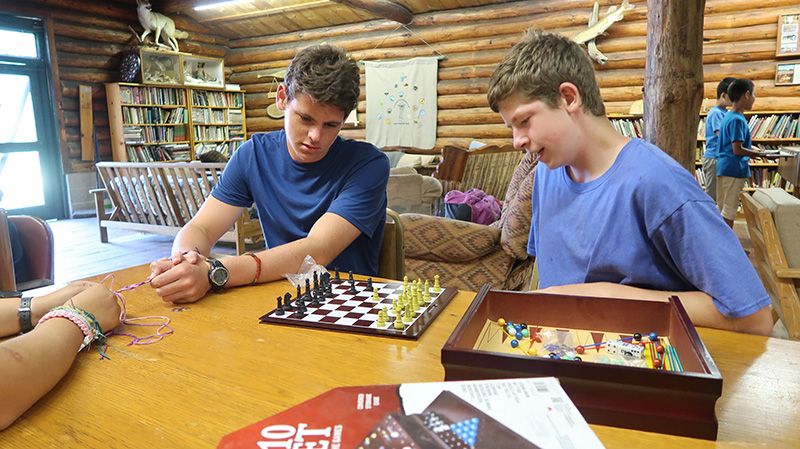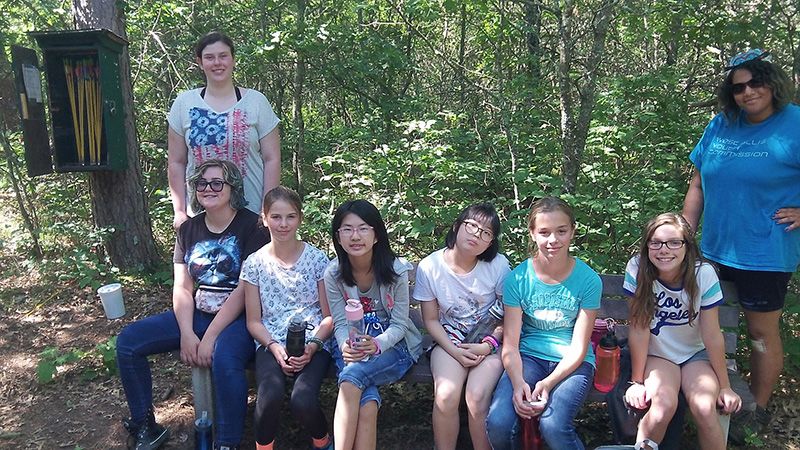Off To Resident Summer Camp
There may be several months between the time that you select your camp and send in your deposit and opening day. However, helping your child prepare for camp involves more than just packing their trunk. You want to make sure that your child is ready emotionally for this new adventure. Preparing your child is a delicate balance. While you want to talk about this exciting new experience, you also don't want to overdo it. With too much discussion, your child may seem to loose a sense of reality, and her expectations and fantasies may never be met, leading to disappointment. It's also possible that she could focus on her fears so much that they become overwhelming, leading her to focus only on how homesick she may be.
Therefore, if there are several months before the beginning of camp, you may want to drop the subject until at least March or April. You will probably begin to receive pre-season information from the camp, and you can share these with your child in your discussions.
How to Talk About Camp
Be careful how often and which words you choose when you are talking about camp. Children have incredible radar, and they will pick up on your concerns and fears, even if you never say anything negative. You may want to visit your local library or movie rental store to pick up books or movies about camp. While many of the storylines are exaggerated, they can prompt discussion on how to handle issues that may arise at camp. Watch or read them together. However, make sure to pick up on the subtle signals that your child sends. If they seem put off by the books or videos, then drop the subject. Most importantly, make sure that you never use camp as a threat or in anger. It's important that you never seem like you're counting the days until your child leaves for camp. The words can linger longer than you think, and it will confuse your child about what camp is supposed to be. Your child should believe that camp is a fun experience and that is why you have chosen it.
Some Dos
Do try to have your child meet the camp director before camp begins.
Do talk about the camp in a positive way, to let your child know that you believe camp is a safe, exciting place.
Do try and arrange a play date with a fellow camper before camp. If this is not possible, try and establish a link through mail, e-mail, or phone.
Do continue to have short separations, such as sleepovers with family and friends for good practice.
Do allow your child to verbalize her concerns, even if they sound silly. You may learn about worries that you can easily resolve.
Do talk to an experienced camper about the program. He or she can tell you what you will really need to pack, what you can leave at home, and what kids really wear, and do at camp.Some Don'ts
Don't introduce anything else new in your child's life. Try to keep everything as normal as possible, especially in the time close to the opening day.
Don't try to squeeze in a family vacation just before camp starts. Plan to be at home for at least five days before your child leaves for camp to provide the comfort of a usual routine.
Don't let your child suspect your on concerns about his adjustment.
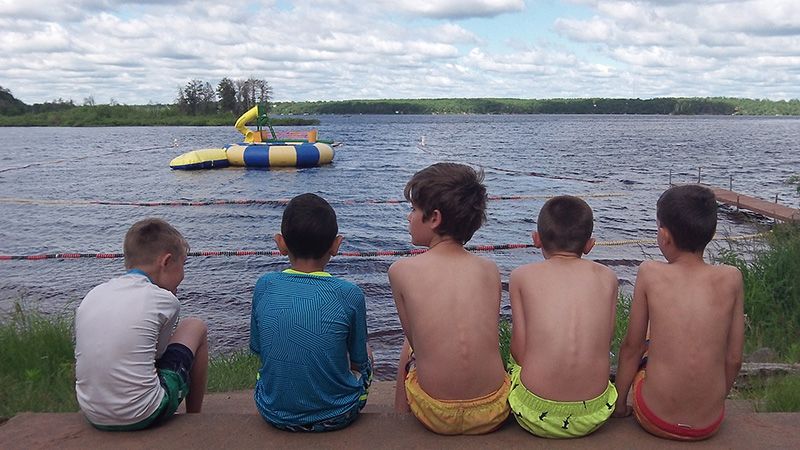 1) Let your child assume responsibility for her room and personal belongings.
1) Let your child assume responsibility for her room and personal belongings.
At camp, children have responsibility for making their own beds and cleaning their personal area. They must keep track of their own belongings. They will be responsible as a group for cleaning up the bunk and sweeping it out on a daily basis. Help your child to learn basic housekeeping skills so that camp responsibilities are less intimidating. If your child is not already responsible for changing her sheets and making her bed, teach her how to do these things. Make sure that your child puts her dirty clothes in the laundry each day. Teach her the difference between 'dirty' and 'wet'. Explain to your child that towels, bathing suits, and clothes soaked by rain should be hung to dry before being put into the laundry. Taking responsibility for her belongings is an important lesson of camp. Practice putting away toys and books so she will know where they are the next time that they are needed.
2) Make personal hygiene a personal responsibility.
Before your child leaves for camp, insist that he assumes responsibility for teeth brushing, showering, and washing his hair without reminder. If this is difficult, make a chart for your child to check off each day. Reserve comment or reminders until the end of the week, and then review the chart together. For girls with long hair, make sure that they know how to brush it and remove tangles. Make sure to pack plenty of conditioner. For girls, one of the popular activities during rest hour is trying different hairstyles or hair braiding. While it's tempting to suggest a haircut for the summer, this transformation can be traumatic for many girls. It's better to practice at home how to keep long hair manageable at camp. Even if your child doesn't normally wear her hair in a ponytail, make sure to pack plenty of hair elastics to tie it back. In the heat of the summer, and while playing active sports, girls will want to keep their hair up.
3) Stay out of peer conflicts.
Learning to resolve disputes between friends is an important life lesson. Though we may want to ease the way for their own children, they need to learn that they are competent to solve their own disagreements with friends. When a child complains about a problem, instead of immediately offering a solution, let her try and figure out her options. Role play various scenarios with your child. The independence with help her when she is living with new people 24 hours a day.
4) Review money management.
If your child will be taking trips and allowed to buy souvenirs, make sure he is comfortable carrying money and counting change. When you are out shopping, let him pay for purchases, and check that he has received the correct change before leaving the counter. If your camp has a canteen, you may have to deposit a certain amount at the beginning of the summer, with possible additions as the season progresses. Agree on a reasonable budget, with suggestions from the director. If your child wants more, you may decide that additional funds must come from her allowance.
5) Practice problem-solving skills.
There are two issues that parents must help their child learn before camp. First, your child must learn to think before acting. Taking time to think about the problem and possible solutions before acting is a sign of maturity. Role play various scenarios with your child and encourage her to think of more than one solution to the problem presented. Let your child know that you have confidence in his abilities to handle the challenges of camp. Secondly, make sure your child knows that it is not just ok, but smart, to ask for help. It's a sign of maturity to know that you should ask for help, and it's the job of the counselors and staff to ask for help. Let your child know that there are many people at camp that can help her, and that she can always go to the camp director with a problem.
6) Just say no!
Make sure that your child understands that it's ok to say no, not just to alcohol, drugs, and tobacco, but also to potentially dangerous situations. Practice what to say if your child is dared to do something that he knows would be off limits at home. Make clear to your child that any safety rule at camp has to be obeyed whether counselors are present or not. This means:
- No swimming without a lifeguard on duty
- Never using sports equipment without permission
- Never playing with ropes courses or riflery, archery, and gymnastics equipment without supervision.
- No matches or lighters
- No wandering away from camp or to off limits areas of camp.
Getting Organized
Even before you get the suggested packing list, you can begin to get organized. Some of the necessary equipment can be purchased early and perhaps on sale. Other should be purchased later to get the right size and style.
Packing More
The camp will send you a suggested packing list, but what is on paper and what is really needed can be two different things. While the camp director is a good resource, an even better one is a family whose child was in camp the previous summer.
The Camp Outfitter
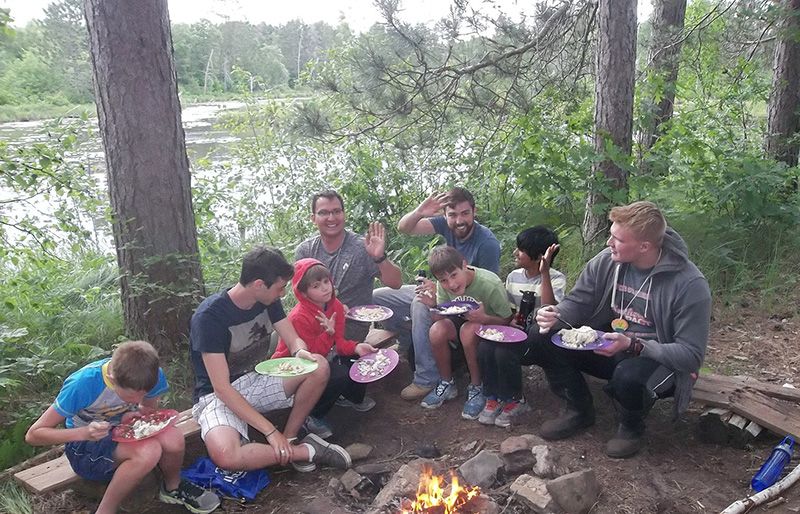 Camp outfitters are commercial establishments that will fit your child from head to toe, and sew in name tags. These stores offer the convenience of one stop shopping and a voice of experience for a price. They can advise on what is really necessary, and they know what kind of materials will stand up to the rigors of summer camp. For some items, these services cost more, and if you shop carefully, you can save money by doing it on your own. However, if your camp requires uniforms, you will still have to do at least part of your shopping with an outfitter.
Camp outfitters are commercial establishments that will fit your child from head to toe, and sew in name tags. These stores offer the convenience of one stop shopping and a voice of experience for a price. They can advise on what is really necessary, and they know what kind of materials will stand up to the rigors of summer camp. For some items, these services cost more, and if you shop carefully, you can save money by doing it on your own. However, if your camp requires uniforms, you will still have to do at least part of your shopping with an outfitter.
You Can Never Have Too Much
When you review the packing list, keep in mind the laundry cycle at camp to calculate how many clothes your child will need to last while others are in the wash. You can never have too many pairs of underwear or socks. Some families send as many as twenty-four pairs of socks. Pack identical, all white socks so that even if some are lost, your child can still make pairs with the remaining ones. Remember most camps do have a limited amount of storage.
What Comes Home
You may not recognize the clothes that return at the end of the summer. If you get them all back, they will probably look smaller, worn out, and still look dirty. Camp life is hard on clothes, and you may have to throw some out when they get back home. Also note the clothes and equipment that comes back looking spotless. This will help you to know what you don't need to pack next year.
Towels
Camp is typically very heavy on water. Your child will be sweating, swimming, and showering. While you shouldn't spend a fortune on luxurious towels, the cheap, thin ones won't last or offer much absorbency. You should get all-cotton towels, but don't get to heavy a weight or they will take too long to dry on the line in humid summer weather. Stay with mostly standard-sized bath towels. Bath sheets are nice to wrap up in, but they tend to get dragged in the dirt because of their overwhelming size.
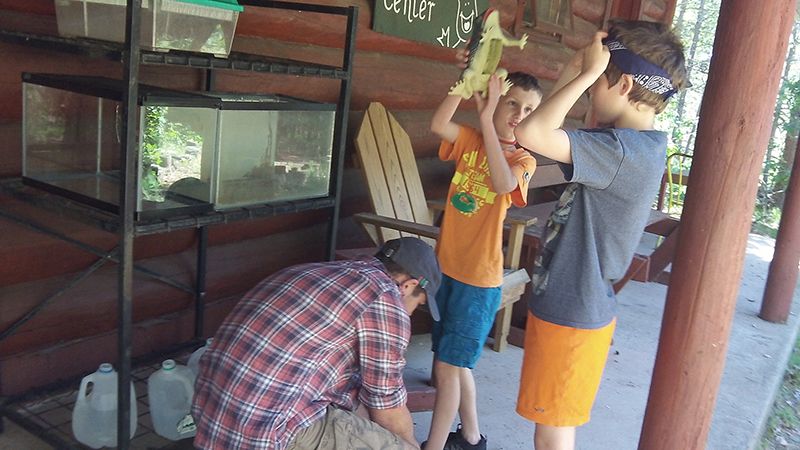 Whose Clothes?
Whose Clothes?
You will want to identify, either with name tapes or permanent marker, every piece of clothing and equipment that you send to camp with your child. Besides identifying clothing for laundry days, there will be many other children at camp who will have identical supplies. Name tags help your child stay organized and help her to find her stuff. Try to mark your child's name in the same place on each garment, and let your child know about these spots.
Keep a List of What you Send
Before you begin to fill up the luggage, make a list of what you are sending, and where it is packed, if there is more than one piece of luggage. Keep one list inside the luggage, and keep another copy of the list at home. This will help your child know what should be coming home, and help you know what you need to replace for the next summer.
How Will it Get to Camp?
Each camp has its own procedure for getting the luggage to the site. The camp will provide directions. Some camps have the trunks sent ahead so that the counselors can unpack them before the campers arrive. While this eases the transition to camp, keep in mind this means that you have to have everything ready several days before camp starts. At other camps, campers will take their belongings with them on the bus and will arrive at the same time as their belongings.
Luggage
The camp director will be able to advise you on what luggage (trunks, duffels, or suitcases) work best for the program. In some camps, luggage is immediately unpacked and stored outside the cabin, in which case you can use whatever you prefer. In other cases, trunks are kept in the bunk and used for storage, making suitcases or soft-sided luggage less practical. Make sure that whatever is required, you invest in sturdy materials. Cheaper cardboard trunks and nylon duffels don't hold up as well. Luggage must be sturdy to hold up the rigors of camp life. If you are sending a trunk, make sure that the latches and lock are functional and that your child can open, close, lock, and unlock the trunk easily. Make sure that you don't over-pack duffels. You child will almost certainly not pack for the return trip as neatly as you do, and you want to make sure that they can close the bags themselves.
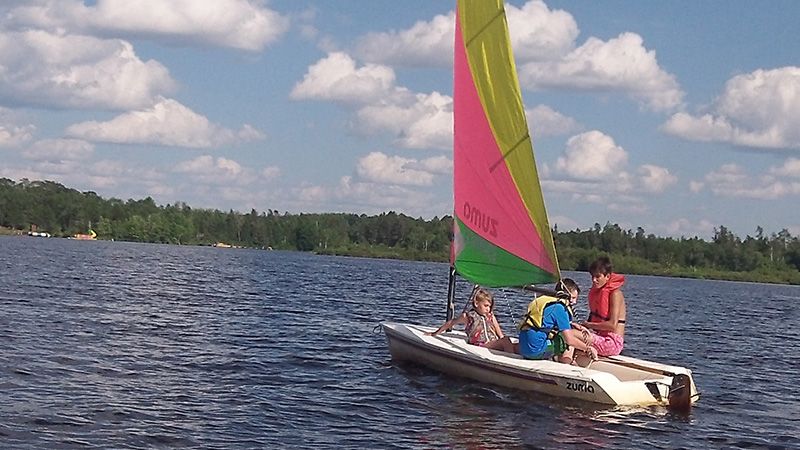 Unwritten Essentials
Unwritten Essentials
From the list your camp provides and from discussions with the director and other campers, you'll know what equipment and clothing to send. However, other essentials that may not be on the list can smooth the transition in the opening days of camp. Some ideas include:
-
Comfort Items: Include a favorite stuffed animal for your camper. If your camper is hesitant or nervous about taking a stuffed animal, think about sending a comforter or pillowcase. A picture of the family and pets can also be reassuring.
-
A First Letter: Include a short message for your camper to find when she opens the trunk and unpacks. Keep the note brief and upbeat. You may also want to include a comic book or something to share with new bunkmates.
-
A Deck of Cards: This is a bunk staple, and gives your child something to play with friends, and also alone if he wishes.
-
A Flashlight: You may want to include more than one. A traditional handheld flashlight is good for walking at night, while a headlamp is good for reading in bed at night.
-
Books: Your child may enjoy reading during rest hour and in bed before going to sleep. You may want to pack magazines and game or puzzle books as well.
- Games: Travel size versions of popular games are fun and provide your child with a connection to other campers.
-
Batteries: Your child will need batteries, especially if they forget to turn off the flashlight overnight.
-
Disposable Camera: A camera is a great way for your child to share their memories of camp with you when they get home.
-
Stationery, Pens, Stamps, Address Book: Make sure to pack some stationery and pre-addressed, stamped envelopes to ensure that you get at least a few letters while your child is at camp. Help your child to make an address book of family and friends, and remind her that she's more likely to get a letter if she writes one.
Medical Checkups
June is a busy month for pediatricians as they try to fit in all the medical checkups for campers preparing to depart. Scheduling your child's appointment in April or May helps you to avoid the rush. Even if you don't have the camp's forms yet, you can schedule the appointment and send the forms in when they arrive. You should also have a dental checkup and any necessary work done before the beginning of camp. Some issues to discuss with your child's doctor include:
-
Vaccinations, Double check that your child is fully immunized and that his tetanus shot is still current.
-
Medications, If your child already takes medication on a routine basis, make sure that you have dosage instructions from your doctor and an adequate supply for the summer. Discuss with your doctor whether your child can take a summer 'holiday' from medication, but do not make this decision without consulting your doctor. Children who are on antidepressants, antipsychotics, or other psychiatric medications should continue to take them. Reassure your child that there will be many other children at camp who take a variety of medications.
-
Allergies, If your child suffers from seasonal allergies, ask if she should change or add to his medications to deal with being in a camp environment.
-
Personal responsibility, Although the camp will have an on-site medical staff, remind your camper that he must assume some responsibility for taking care of himself. Many camps accept children with chronic diseases such as asthma or diabetes, but unfortunately, kids sometimes see camp as a way to escape dealing with the illness.
-
Don't rely on forms, Although you will provide the camp with the medical forms and information, ask to speak directly with your child's counselor and the camp medical staff if your child has a potentially life-threatening illness or condition.
-
Insect repellant and sunscreen, Be sure to pack both in your child's bag, but also review the use with your child. Sunscreens, even waterproof varieties, only delay sunburn, and must be frequently reapplied if your camper is having extended exposure to the sun. Its important to remind your campers to wear hats and shirts, and to apply a sunblock, such as zinc oxide on the nose and cheeks, when around the water for an extended period of time.
-
Glasses, Invests in a second set and send both to camp. You should also include your child's prescription for glasses or contact lenses with the medical forms.
-
Check with the orthodontist, Many camps can arrange for emergency and routine orthodontic treatment. Ask if your child's treatment can wait until after camp, or if the camp's dental professionals can handle any necessary routine treatment. Have your orthodontist write a list of instructions, and be sure and pack any necessary equipment (rubber bands, head gear, retainers).
Off to Camp
Months of searching, decision-making, preparation, and packing, the last night before departure for camp can be hectic and seem surreal.
Get Organized
You want to avoid any disasters in the morning, so lay out what you and your child agree that she will wear in the morning. The emphasis should be on both physical and psychological comfort.
Make sure that any new clothing is washed and that shoes are broken in. If you have any additional paperwork that needs to get to camp, place it in an envelope with your child's name on the outside.
Put all camp supplies by the door so that you don't have to search for last minute items in the morning. Try to keep the night before camp a quiet evening. You want your child to be rested. Try to keep your child's regular bedtime and if necessary, linger a few minutes for last minute reassurance.
The Goodbye
The best case scenario for the goodbye is a warm, quick hug and a few words of love. It is not the time for reflections on what everything means. Try to stave off tears until you are alone. Your child may be fighting his emotions, and may not be able to keep his own tears back if he sees yours. On the other hand, if you do fall apart, that's ok. You may be momentarily embarrassed, but it will pass. If your child starts to cry, remind him that you know it's hard to separate and that it's scary to try something new. Reassure your child that you are sure that she is ready for camp and that she'll have a wonderful time. It's not beneficial to you or your child to prolong this conversation. Ask one of your camp counselors to help your child get on the bus. Try to remember that separation may be difficult, but going to camp will provide your child with new opportunities for growth. Be assured that good camp programs are prepared to help children overcome homesickness, and they are ready, willing, and able to make sure your child enjoys this new experience.

